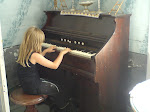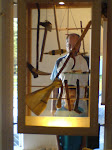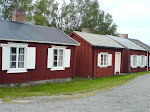Jag översatte citaten ur läsarbrevet i blogposten "
Diagnosis".
Läkaren Gwenda Delany skriver att den “heart-sinks” (knepiga patienten, som får modet att sjunka hos dess behandlare??) beteende blir begripligt och är totalt ändamålsenligt och konsekvent om vi håller i minnet den starka möjligheten av en tidigare historia av övergrepp i dess vidaste betydelse: känslomässig/emotionell, fysisk, sexuell. Vi bör bestämma oss för att se den ”heartsink” patienten för vilken saker gick allvarligt fel för tidigt i livet; i en relation av tillit, i ett sårbart stadium i utvecklingen.
"Känslor är alltid sanna och alltid rationella, dvs. de är alltid ändamålsenliga och proportionerliga jämfört med ursprunglig orsak. De kan därför bli trodda på även när de verkar vara omöjliga att koppla till någonting i patientens nuvarande omständigheter; och även om deras ursprungliga orsak förblir oupptäckt under alla våra konsultationer tillsammans. Vår svårighet att 'få ihop bilden' kan indikera att vi har att göra med en patients bortträngda erfarenheter, iscensatta på exakt samma dunkla sätt, där lyssnaren/doktorn används som en lättillgänglig och lämplig överföringsfigur."
Hon menar att det
"...inte finns verkligt helande utan att avtäcka/blotta det gångna [!!] /.../Att undersöka känslor från det gångna är intensivt/starkt för den lidande, en smärta som bara kan matchas av känslorna som är bortträngda med 'heartsink'strategier."
Men jag vill understryka att jag citerade detta med hjälpare i åtanke och vilka metoder de använder (att bara plåstra över!! Jag citerade detta inte för att moralisera över hjälpsökande som kämpar med sina liv, kanske i en medioker terapi!!!)
Läkaren Judith Burchardt skriver i sitt appendix till Delanys artikel att:
"När A växer upp ändras situationen. Bortträngningen av hennes vrede är nu inte längre nödvändig och den är också kontraproduktiv för As välbefinnande. Därför att A är omedveten om sin vrede kommer den troligtvis att förbli bortträngd sorgligt nog. Hon lever med den omedvetna vreden inuti sig och är tvingad att uttrycka den på något annat sätt. Vreden kan uttryckas mot henne själv (som i depression, självskadande och psykosomatisk sjukdom), hennes barn (som övergrepp/kränkningar på barn) eller mot andra över vilka hon har makt (som i våld eller översitteri). Motsatt kan hon återuppleva sin egen vrede genom att utveckla relationer med andra människor där de kommer att kränka henne.”
Delany skriver också om upprepningstvång:
”Upprepningstvång: bortträngda erfarenheter är starkare än förnuft och argument eller kognitiv terapi; antingen man vill eller inte, med eller mot sin vilja iscensätts de igen och igen på många olika sätt genom patientens hela liv, såvida inte och ända till den otillåtna bortträngda känslorna och deras triggande händelser har identifierats och medvetet upplevts och reagerats på (med sorg, vrede eller indignation) av den lidande. Det enda sätter detta kan göras på för patienten är att återbesöka dem; om allt annat misslyckas, ensam, men låta oss hoppas att hon kan göra detta i sällskap med någon som är villig att lyssna, under någon form av ’pratande’ terapi: vilket lyckligtvis kan vara informellt och (endast) för detta ändamål/ad hoc (??) som ett möte i våra (läkar)mottagningar.”
-//-
I have translated the quotations from the post "Diagnosis" from English to Swedish.
Delany also writes about:
“Many ‘heartsink’ patients will turn out to have suffered such gross and overt abuse: though feelings of confusion, intolerable shame and self-blame may still be preventing them from disclosing, or even from consciously remembering it.
There are other forms of ill-treatment; as well s less extreme physical and sexual abuse, there is a whole spectrum of gross and subtle emotional damage /…/ In emotional abuse, the child’s love, trust and attachment are used to warp the course of the child’s development in the (un)conscious interests of the adult, who is lashing out with unresolved damage of her own /…/
What these parents have in common is that they provide an insecure environment for the developing child, where she learns not to trust herself or others; where she is expected to strive after goals which entail giving up much of her own spontaneity and creativity to others’ demands. This is likely to leave its lasting mark in depriving her of self-esteem and self-confidence, and leave her with feelings of anger and outrage she may not even be aware of. All the same, they are painfully eating away at her, and are making her feel worthless; even if she is busy establishing what appears to be a fulfilling life, with a successful career and happy family. Unknown to her, inside him, a cry has been waiting to be heard since childhood /…/
Repression occurs whenever an experience during childhood and development gives rise to feelings that are not fully lived through and assimilated: because these feelings are forbidden/too painful/too confusing for the child, and because there is no-one more experienced available to help the child identify and deal with them. Today more experimental evidence is becoming available that supports this hypothesis; e.g. in accessible books on the overlap of child psychology and neurophysiology, such as “How babies think.” A child without adequate support is unable to cope with such intense conflict as: ‘I love my parents/ carers but they injure me, physically/ sexually/ emotionally’. (This applies to the concept of abuse in the widest sense of the word, from the limited to the life-threatening) Having got off to a faulty start in life with such an unmanageable and unassimilated experience, the grown-up child is then disabled from handling feelings aroused by similar abusive situations that come her way in adult life. She will lack empathy or understanding for herself or for others (often her own children) who have been or who are being abused in similar ways. At the same time the mental energy needed to keep the old chaotic and unwanted feelings safely repressed and unconscious, is not available to the patient for more creative purposes and leaves her feeling drained, inadequate and bad. The sufferer feels non-specifically unwell all the time, and may decide to consult someone about her elusive health problems.”
Helpers (that haven’t worked their own through, and many who should have done haven’t either??) doesn’t want to see the symptoms for what they truly are signs of!? And this mean the client has to control them to get “help”!? If he/she succeeds in doing so he/she has succeeded!? As the nice boy/girl who has satisfied his/her parent with the right behavior and attitude?
Delany also mentions the power imbalance between doctor-patient and what this means (beginning of chapter 3).
She also writes in her “Conclusion” that:
“The care of the ‘sinking heart’ patient is easy if we let it be. In fact, until the patient herself gives us the go-ahead, we don’t need to do anything about it. We don’t need to come up with advice, recommendations, or treatment. We can afford to admit our ignorance: the patient has the answers, all we can do is wait for them in an atmosphere of optimism and confidence –knowing the answers are there, even if we don’t know what they are. There is as yet a limited, but growing, evidence base: meanwhile a qualitative/ narrative approach, empirical experience and intuitive assent constitute a provisional one rich enough to be getting on with.”
Came to think of how it is here in health care now; do doctors have time for such consultations? Not being stressed, in a hurry etc.? They shall be so effective…
And I also came to think when I read Burchardt’s appendix about Jenson and what she has written; something about the simple truth. That there isn’t needed any complicated theories (they can instead be an obstacle), to keep things in control and on place. She writes something about the simple answers? (I don’t find this/these part/parts in her book now).
To being asked to understand (explicitly or implicitly) by a helper/therapist/doctor is more of the same, and it is to strengthen one of the denial-strategies, namely rationalising also stuck me on my way to work today?? But with this no healing will come about!? But it is probably a protection against the pain, and thus against the truth – and healing, which was needed then to survive but causes problems now??
English word of today ”willy nilly” which means “antingen man vill eller inte, med eller mot sin vilja”.






























